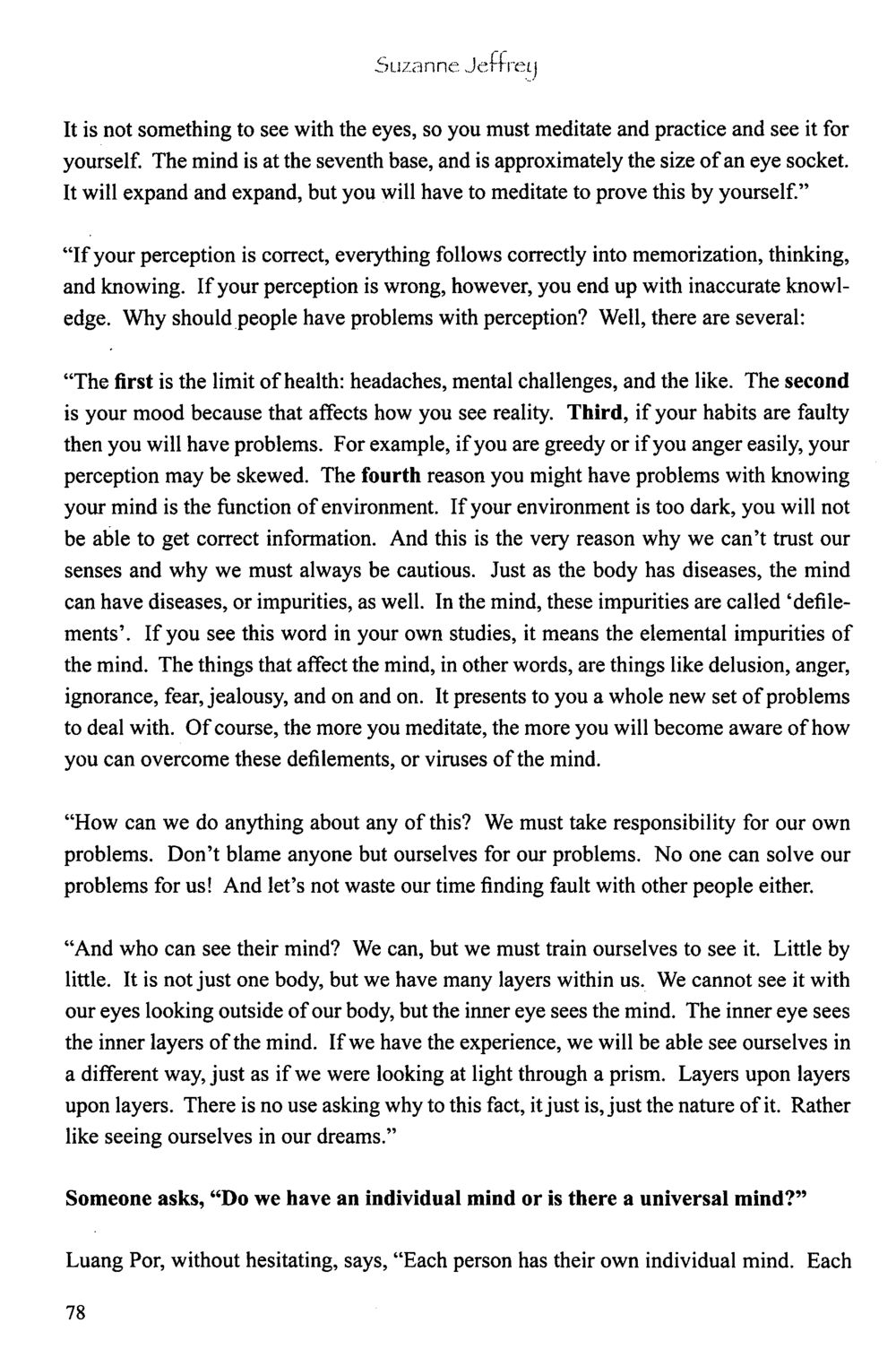Exploring the Nature of the Mind : หน้า 80/164
The Meeting with a Dhamma Master : หน้า 80/164 A deep dive into the complexities of perception, meditation, and the individual mind versus the universal mind. Learn to recognize mental defilements and take responsibility for your perceptions.
0 ครั้ง

สรุปเนื้อหา
This text discusses the importance of meditation and self-awareness in understanding the mind. It highlights how our perceptions affect our knowledge and the various challenges like health and mood that can distort our views. The author emphasizes that taking responsibility for our mental state is crucial. Through meditation, we can identify mental impurities, or 'defilements', which include negative emotions such as anger and jealousy. The idea of the individual versus universal mind is also explored, asserting that while everyone has an individual mind, training our perception is key to deeper understanding. For further insights, visit dmc.tv.
หัวข้อประเด็น
-meditation
-perception
-mental health
-defilements
-individual mind
-universal mind
ข้อความต้นฉบับในหน้า
Suzanne Jeffrey
It is not something to see with the eyes, so you must meditate and practice and see it for yourself. The mind is at the seventh base, and is approximately the size of an eye socket. It will expand and expand, but you will have to meditate to prove this by yourself."
"If your perception is correct, everything follows correctly into memorization, thinking, and knowing. If your perception is wrong, however, you end up with inaccurate knowledge. Why should people have problems with perception? Well, there are several:
"The first is the limit of health: headaches, mental challenges, and the like. The second is your mood because that affects how you see reality. Third, if your habits are faulty then you will have problems. For example, if you are greedy or if you anger easily, your perception may be skewed. The fourth reason you might have problems with knowing your mind is the function of environment. If your environment is too dark, you will not be able to get correct information. And this is the very reason why we can’t trust our senses and why we must always be cautious. Just as the body has diseases, the mind can have diseases, or impurities, as well. In the mind, these impurities are called ‘defile-ments’. If you see this word in your own studies, it means the elemental impurities of the mind. The things that affect the mind, in other words, are things like delusion, anger, ignorance, fear, jealousy, and on and on. It presents to you a whole new set of problems to deal with. Of course, the more you meditate, the more you will become aware of how you can overcome these defilements, or viruses of the mind.
"How can we do anything about any of this? We must take responsibility for our own problems. Don’t blame anyone but ourselves for our problems. No one can solve our problems for us! And let’s not waste our time finding fault with other people either.
"And who can see their mind? We can, but we must train ourselves to see it. Little by little. It is not just one body, but we have many layers within us. We cannot see it with our eyes looking outside of our body, but the inner eye sees the mind. The inner eye sees the inner layers of the mind. If we have the experience, we will be able see ourselves in a different way, just as if we were looking at light through a prism. Layers upon layers upon layers. There is no use asking why to this fact, it just is, just the nature of it. Rather like seeing ourselves in our dreams."
Someone asks, “Do we have an individual mind or is there a universal mind?”
Luang Por, without hesitating, says, “Each person has their own individual mind. Each
หน้าหนังสือทั้งหมด

1

2

3

4

5

6

7

8

9

10

11

12

13

14

15

16

17

18

19

20

21

22

23

24

25

26

27

28

29

30

31

32

33

34

35

36

37

38

39

40

41

42

43

44

45

46

47

48

49

50

51

52

53

54

55

56

57

58

59

60

61

62

63

64

65

66

67

68

69

70

71

72

73

74

75

76

77

78

79

80

81

82

83

84

85

86

87

88

89

90

91

92

93

94

95

96

97

98

99

100

101

102

103

104

105

106

107

108

109

110

111

112

113

114

115

116

117

118

119

120

121

122

123

124

125

126

127

128

129

130

131

132

133

134

135

136

137

138

139

140

141

142

143

144

145

146

147

148

149

150

151

152

153

154

155

156

157

158

159

160

161

162

163

164
หนังสือที่เกี่ยวข้อง
Load More
